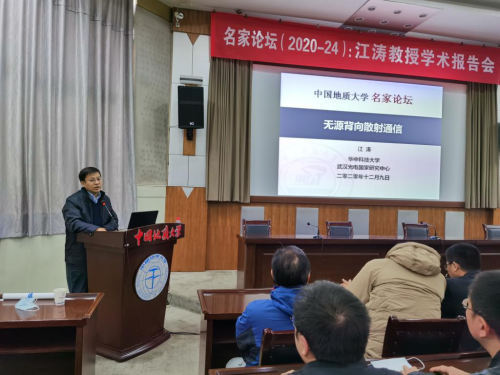In order to activate the academic atmosphere, promote the first-class undergraduate construction of electronic information engineering based on “Double First-class Program”, and improve the construction level of information and communication engineering discipline, professor Jiangtao from the School of Electronic Information and Communications, HUST delivered an academic report entitled “Passive Backscatter Communication”. The meeting was presided over by Professor Wen Guojun, and the teachers and postgraduates attended the meeting.
Jiang Tao, IEEE Fellow, professor and PhD supervisor of Huazhong University of Science and Technology, a member of the national overall expert group for research and development of the sixth generation of mobile communication technology, enjoys the special government subsidy of the State Council, and serves as the associate editor of China Communications and the editorial board member of IEEE Network, IEEE Transactions on Signal Processing, IEEE Transactions on Vehicular Technology, IEEE Communications Surveys and Tutorials, IEEE Internet of Thing and other journals. Professor Jiang Tao has long been engaged in the research on group intelligence, multicarrier broadband communication, integrated information network. PCC Polar Code proposed by him has been officially adopted as 5G standard. He has published more than 400 academic papers, including more than 250 IEEE journal papers, published 4 monographs; has been authorized more than 30 invention patents and more than 10 PCT patents; and has successively won the second prize of national technological invention award, the first prize of Natural Science Award of Hubei Province, and the first prize of Natural Science Award of China Institute of Electronics as the first person-in-charge.

The report mainly introduces the passive backscatter communication. As a revolutionary communication paradigm developed in recent years, it abandons the traditional high-power analog devices, absorbs energy from the electromagnetic wave that is prevalent in the environment, and completes information transmission by modulating the electromagnetic wave in the environment. Therefore, the power consumption, cost, weight and volume of terminal equipment are significantly reduced, and it can be widely applied in vertical industries, such as micro UAVs, implantable medical equipment, smart city and industrial safety monitoring. However, due to the technical bottleneck of passive backscatter communication in transmission distance and rate, the deployment still faces great challenges. The report also introduces the research progress in communication theory, hardware design and practical application of passive backscatter from specific technical aspects, including backscatter coding, modulation, beamforming and other key physical layer technologies, equipment development, and its application in terminal equipment security certification and wireless positioning.
The teachers and students raised questions and professor Jiang Tao shared some suggestions on the study and life of postgraduates and his experience in writing and publishing papers.